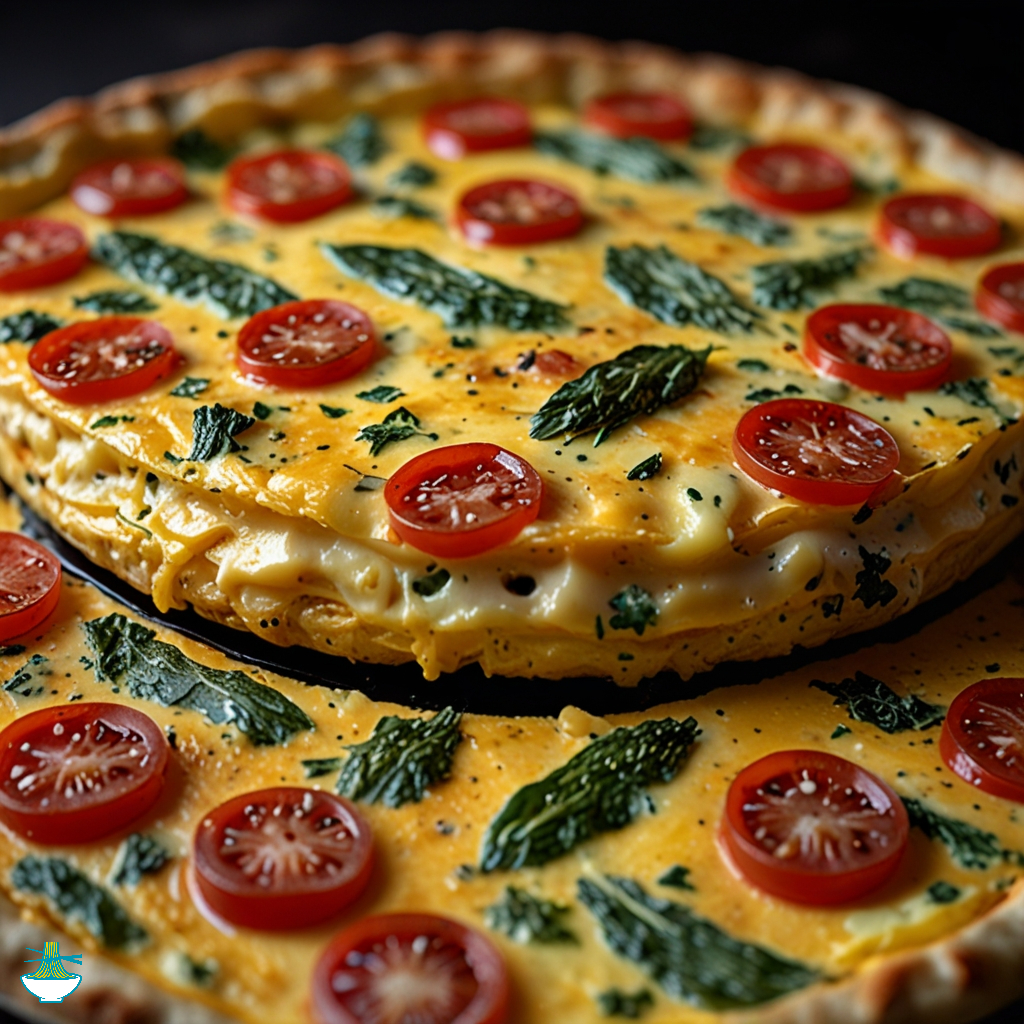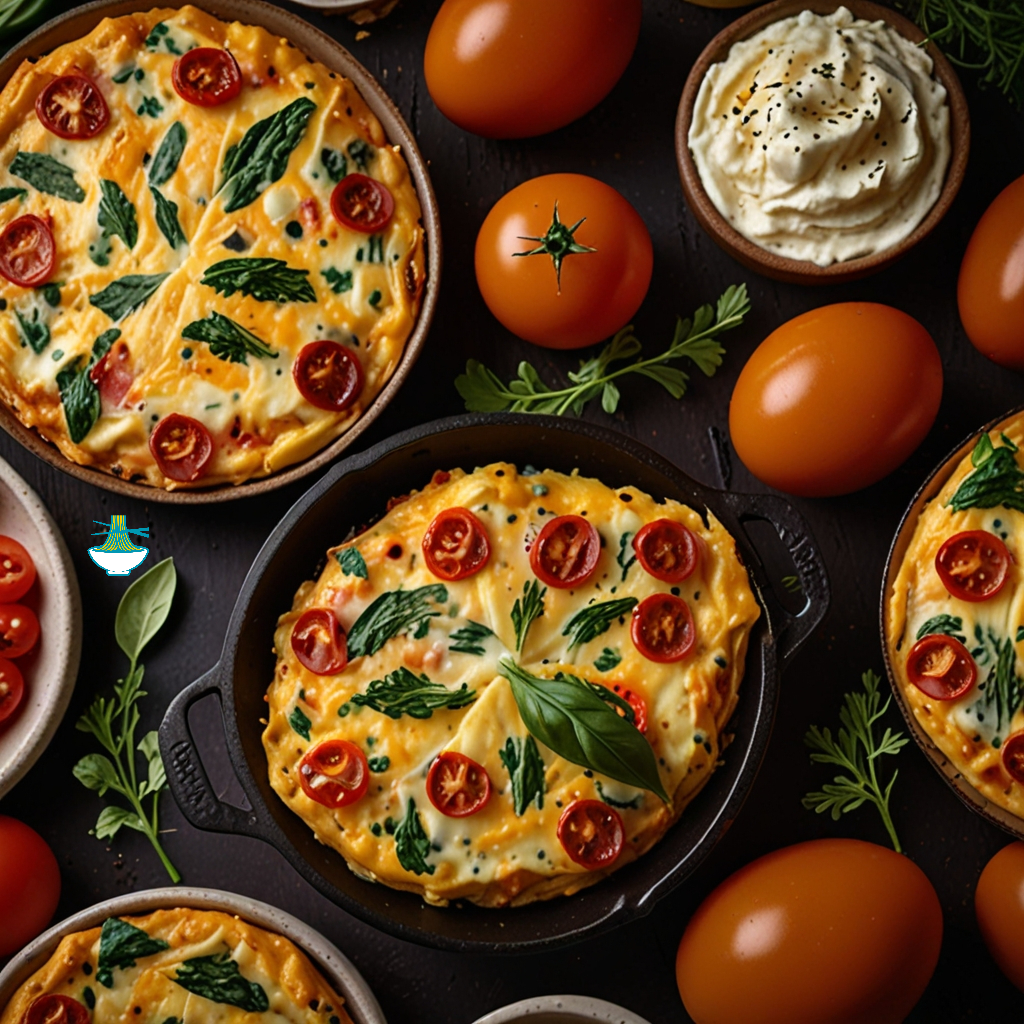The frittata is a classic Italian dish, resembling an omelet, made with eggs, cheese, and various fillings such as vegetables, herbs, and meats. It's versatile, allowing for customization based on personal preference and seasonal ingredients. 
Historically, the frittata has humble origins, often serving as a practical way to use up leftover ingredients. Its name derives from the Italian verb "friggere," meaning "to fry," highlighting its cooking method. While its exact origins are unclear, the frittata has been a staple of Italian cuisine for centuries, enjoyed as a hearty breakfast, brunch, or light dinner dish. Over time, it has evolved into a beloved comfort food enjoyed worldwide for its simplicity and delicious flavors.
Ingredients:
- 6 large eggs
- 1/2 cup grated Parmesan cheese
- Salt and pepper to taste
- 1 tablespoon olive oil
- 1 small onion, diced
- 1 bell pepper, diced
- 1 cup sliced mushrooms
- 2 cups baby spinach leaves
Method:
1. Preheat your oven broiler on high heat.
2. In a mixing bowl, whisk together the eggs, grated Parmesan cheese, salt, and pepper until well combined. Set aside.
3. Heat olive oil in an oven-safe skillet over medium heat. Add diced onion and bell pepper, cooking until softened, about 5 minutes.
4. Add sliced mushrooms to the skillet and cook until they release their moisture and start to brown, about 5 minutes.
5. Add baby spinach leaves to the skillet and cook until wilted, about 2 minutes.
6. Pour the egg mixture over the vegetables in the skillet, ensuring an even distribution.
7. Cook without stirring until the edges start to set, about 2 minutes.
8. Transfer the skillet to the preheated oven and broil until the frittata is set and golden brown on top, about 5 minutes.
9. Remove from the oven and let it cool slightly before slicing and serving.
Enjoy your delicious and simple Italian frittata!
Nutrition Value:
1. 6 large eggs:
- Calories: Approximately 78 calories per egg
- Carbohydrates: About 0.6 grams per egg
- Protein: Around 6.3 grams per egg
- Fat: Approximately 5.3 grams per egg
- Sodium: About 62 milligrams per egg
- Cholesterol: Around 186 milligrams per egg
- Vitamins: Rich in vitamins A, B2, B12, and D, along with essential nutrients like choline and selenium
- Minerals: Contains minerals like iron, phosphorus, and zinc
- Nutritional Benefit: Eggs are a good source of high-quality protein, essential vitamins, and minerals. They promote muscle growth, provide sustained energy, and support brain health.
2. 1/2 cup grated Parmesan cheese:
- Calories: Approximately 216 calories per 1/2 cup
- Carbohydrates: About 2 grams per 1/2 cup
- Protein: Around 20 grams per 1/2 cup
- Fat: Approximately 14 grams per 1/2 cup
- Sodium: About 882 milligrams per 1/2 cup
- Cholesterol: Around 41 milligrams per 1/2 cup
- Vitamins: Rich in calcium, vitamin A, and vitamin B12
- Minerals: Contains calcium and phosphorus
- Nutritional Benefit: Parmesan cheese provides a rich source of calcium for bone health, along with protein and essential vitamins. However, it should be consumed in moderation due to its high sodium content.
3. Salt and pepper to taste:
- Salt and pepper don't contribute significant calories, carbohydrates, protein, or fat, but they enhance the flavor of the dish. Excessive salt intake should be avoided to maintain overall health.
4. 1 tablespoon olive oil:
- Calories: Approximately 119 calories per tablespoon
- Carbohydrates: About 0 grams per tablespoon
- Protein: Around 0 grams per tablespoon
- Fat: Approximately 14 grams per tablespoon
- Sodium: About 0 milligrams per tablespoon
- Cholesterol: Around 0 milligrams per tablespoon
- Vitamins: Rich in vitamin E and vitamin K
- Minerals: Contains small amounts of iron and calcium
- Nutritional Benefit: Olive oil is a source of healthy monounsaturated fats, which promote heart health and provide antioxidants. It also aids in the absorption of fat-soluble vitamins.
5. 1 small onion, diced:
- Calories: Approximately 32 calories per small onion
- Carbohydrates: About 7.5 grams per small onion
- Protein: Around 1 gram per small onion
- Fat: Approximately 0 grams per small onion
- Sodium: About 3 milligrams per small onion
- Cholesterol: Around 0 milligrams per small onion
- Vitamins: Rich in vitamin C, vitamin B6, and folate
- Minerals: Contains potassium and manganese
- Nutritional Benefit: Onions provide antioxidants, support immune function, and may have anti-inflammatory properties.
6. 1 bell pepper, diced:
- Calories: Approximately 24 calories per bell pepper
- Carbohydrates: About 6 grams per bell pepper
- Protein: Around 1 gram per bell pepper
- Fat: Approximately 0 grams per bell pepper
- Sodium: About 2 milligrams per bell pepper
- Cholesterol: Around 0 milligrams per bell pepper
- Vitamins: Rich in vitamin C, vitamin A, and vitamin B6
- Minerals: Contains potassium and folate
- Nutritional Benefit: Bell peppers are low in calories and provide essential vitamins and antioxidants that support eye health and immune function.
7. 1 cup sliced mushrooms:
- Calories: Approximately 15 calories per cup
- Carbohydrates: About 2.3 grams per cup
- Protein: Around 2.2 grams per cup
- Fat: Approximately 0.2 grams per cup
- Sodium: About 2 milligrams per cup
- Cholesterol: Around 0 milligrams per cup
- Vitamins: Rich in vitamin D, vitamin B2, and niacin
- Minerals: Contains potassium and selenium
- Nutritional Benefit: Mushrooms are low in calories and provide protein, vitamins, and minerals. They also contain antioxidants and may have immune-boosting properties.
8. 2 cups baby spinach leaves:
- Calories: Approximately 14 calories per cup
- Carbohydrates: About 2 grams per cup
- Protein: Around 1 gram per cup
- Fat: Approximately 0 grams per cup
- Sodium: About 24 milligrams per cup
- Cholesterol: Around 0 milligrams per cup
- Vitamins: Rich in vitamin A, vitamin C, and vitamin K
- Minerals: Contains iron, magnesium, and potassium
- Nutritional Benefit: Spinach is a nutrient-dense leafy green vegetable, providing vitamins, minerals, and antioxidants. It supports bone health, aids digestion, and may help regulate blood pressure.-
Overall, this recipe provides a balanced mix of nutrients, including protein, healthy fats, vitamins, and minerals, contributing to a nutritious and delicious meal.


Comments